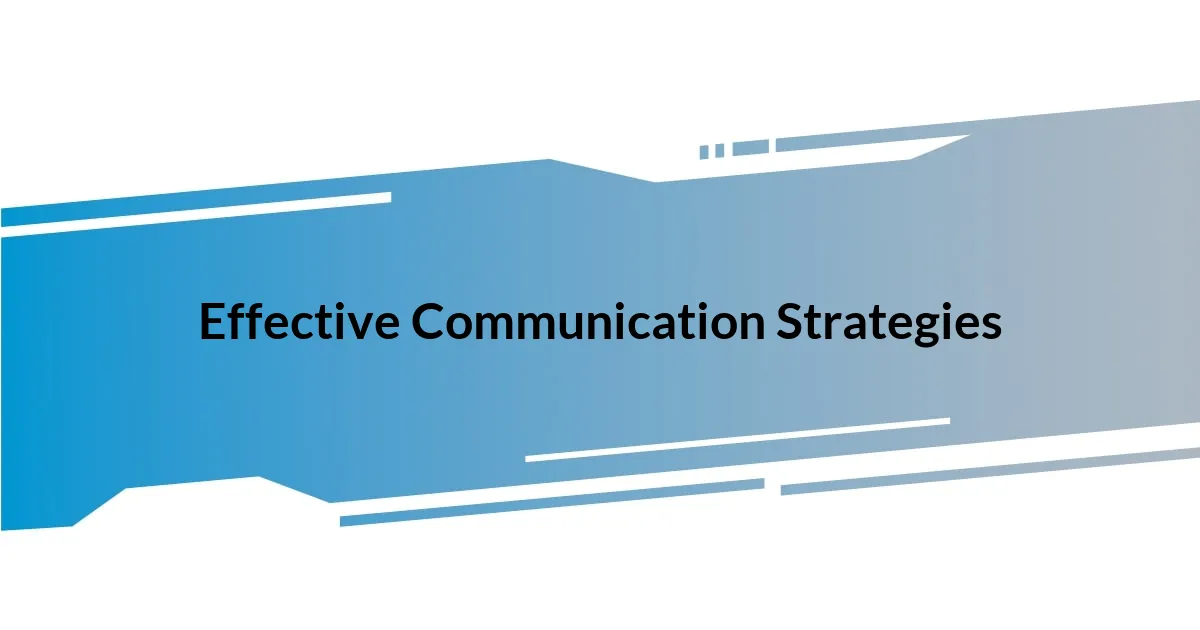Key takeaways:
- Sibling rivalry is a natural expression of complex emotions, often rooted in the desire for attention, perceived favoritism, and developmental differences.
- Effective communication strategies, such as open discussions, active listening, and using “I” statements, play a critical role in resolving conflicts and promoting understanding.
- Setting clear boundaries and encouraging individual interests can foster a respectful and supportive home environment, reducing rivalry among siblings.
- Regular evaluation of interactions and celebrating progress helps reinforce positive dynamics and strengthens sibling relationships.

Understanding Sibling Rivalry
Sibling rivalry is a natural part of growing up, stemming from the unique bond siblings share. Reflecting on my own childhood, I remember how the smallest situations, like the remote control or the last cookie, could spark intense competition between my brother and me. Have you ever found yourself entrenched in a silly battle over something trivial with a sibling? In those moments, it was more about seeking attention or asserting my importance rather than the object itself.
The emotions tied to sibling rivalry are often deeper than they appear on the surface. I recall feeling a mix of jealousy and admiration when my sister excelled in school, which led to days of tension between us. This dynamic can be complicated; it’s a delicate dance of love intertwined with the desire to compete. Can you see how these feelings may lead to conflicts that feel both familiar and frustrating?
Moreover, understanding sibling rivalry requires recognizing that it can also serve as a learning experience for conflict resolution. I remember watching my parents navigate our disputes, often encouraging us to express our feelings instead of bottling them up. This not only helped alleviate the tension but also taught us valuable communication skills. Isn’t it fascinating how these childhood experiences shape our adult relationships?

Recognizing the Root Causes
To truly address sibling rivalry, it’s essential to pinpoint what’s fueling the competition. From my perspective, this often boils down to a few key factors that are all too relatable. When I think back, I vividly recall moments of feeling overshadowed or, conversely, pressured to shine. Recognizing these triggers can help unravel the emotional threads that drive rivalry.
- Desire for Attention: Siblings may compete simply to grab the spotlight in a busy household. I remember feeling like I had to act out to get my parents’ attention when my brother’s achievements seemed to eclipse my own.
- Perceived Favoritism: Sometimes, it feels like one sibling is the favorite. I distinctly felt this when my parents praised my sister for her artistic talents while my own efforts went unnoticed.
- Developmental Milestones: Differences in age and maturity can lead to jealousy. I once felt a pang of envy as my younger brother experienced life milestones before I did.
- Lack of Conflict Resolution Skills: Growing up, I noticed that our family didn’t always model effective communication, leading to misunderstandings that escalated quickly.
By identifying these core causes, we can create a path toward healthier sibling relationships. It requires vigilance and empathy, but the payoff is a better understanding of one another.

Effective Communication Strategies
When navigating the waters of sibling rivalry, effective communication stands out as a vital tool. I learned early on that openly discussing feelings often diffused tension. For instance, I remember sitting down with my brother after a particularly heated argument over a toy. We both took turns expressing our frustrations and realized that we were upset not just about the toy, but because we both felt we weren’t being heard. By listening to each other, we not only resolved the conflict but also strengthened our bond.
Active listening is another strategy I highly recommend. It allows each sibling to feel valued and acknowledged. I recall a time when my younger sister cried because she felt overlooked during family game nights. Instead of dismissing her feelings, I sat beside her, listened, and encouraged her to share what made her feel excluded. This simple act fostered understanding and led to changes that made our game nights more inclusive.
Lastly, using “I” statements can transform blaming into constructive dialogue. For example, instead of saying, “You always take my stuff,” I might say, “I feel upset when my things are used without asking.” This subtle shift helps in expressing feelings without escalating the situation, making conflict resolution so much smoother in our household.
| Communication Strategy | Description |
|---|---|
| Open Discussion | Encouraging siblings to share their feelings openly can prevent misunderstandings and promote empathy. |
| Active Listening | Fostering an environment where each sibling feels heard leads to more respectful and understanding interactions. |
| I Statements | Using “I” statements shifts focus from blame to personal feelings, facilitating healthier conversations. |

Setting Boundaries Between Siblings
Setting clear boundaries between siblings is crucial for maintaining a peaceful home dynamic. I vividly remember the time my brother kept borrowing my favorite video game without asking, which led to resentment on my part. After one too many heated exchanges, we decided to establish some ground rules—like asking before borrowing anything. This simple agreement not only reduced conflict but made us feel more respected and understood.
Another boundary I’ve found effective involves creating individual spaces for each sibling. I always appreciated having my own room where I could escape and recharge. It became a sanctuary where I could cultivate my interests without interruptions. Fostering these personal areas allowed both my sister and me to explore our identities and reduced the likelihood of stepping on each other’s toes.
Moving forward, I learned the importance of timeouts in conflicts. During a particularly intense disagreement over whose turn it was to choose a movie, I suggested we take a break. This pause allowed us to cool down and reflect on our feelings. Afterward, we returned with a fresh perspective, which led to a much more cooperative decision. Isn’t it interesting how stepping back can shift our emotions from frustration to understanding? Setting boundaries and learning to respect them is a continuous journey, but it’s one that pays off immensely.

Promoting Cooperative Activities
One effective way to promote cooperation is by engaging siblings in shared activities that require teamwork. I recall a summer when my sister and I decided to build a treehouse together. Initially, we bickered over how it should look—she wanted it cozy, while I envisioned a fortress. But as we worked through our ideas, we discovered that combining our different visions resulted in a space neither of us could have created alone. Isn’t it amazing how collaboration can spark creativity and strengthen relationships?
Creating shared responsibilities can also foster a sense of teamwork. For instance, I remember when our family adopted a puppy. My siblings and I had to establish a chore schedule for feeding and walking the little guy. These shared tasks turned into opportunities for bonding; we would joke about our puppy’s antics and support each other through the challenges of training. How often do you find that teamwork can turn mundane tasks into cherished memories?
Another aspect to consider is organizing friendly competitions where everyone can contribute to a common goal. I once facilitated a mini sports day for my siblings, setting up fun games and challenges tailored to each of our strengths. The laughter we shared during relay races and the cheers of encouragement truly created a sense of camaraderie. It made me realize that even in rivalry, moments of fun can unite rather than divide. What could be more rewarding than turning competition into an opportunity for connection?

Encouraging Individual Interests
Encouraging individual interests can help siblings find their own identities, which is vital in reducing rivalry. I vividly remember when my sister discovered her love for painting. Rather than trying to join in, I decided to support her by setting up a little art corner for her in our shared space. Watching her immerse herself in her creativity felt special, and it also taught me to appreciate our differences. Isn’t it remarkable how giving space for individual passions can breed a feeling of personal accomplishment?
In my experience, supporting siblings in their unique pursuits has been eye-opening. For instance, my younger brother became obsessed with soccer. Instead of just cheering him on from the sidelines, I started attending his games, which let me celebrate his achievements. Sharing in our passions not only strengthened our bond but allowed us to see each other’s strengths. Isn’t it fascinating how becoming a cheerleader for their interests can keep jealousy at bay?
One thing I’ve learned is that it’s important to celebrate achievements, big or small. I initiated a “family showcase” night where everyone could share their hobbies—be it a painting, a soccer highlight reel, or even a poem. This not only allowed us to appreciate each other’s talents but also built a sense of pride that overshadowed any rivalry. Have you ever noticed how acknowledging individual accomplishments fosters a positive family atmosphere? I can confidently say that it’s a game-changer.

Evaluating Progress and Adjusting
Evaluating progress in reducing sibling rivalry is essential, as it allows us to understand what works and what needs adjustment. I remember a time when my siblings and I agreed to check in with each other after our cooperative activities. One evening, we gathered around the dining table and discussed how we felt about our interactions. It was enlightening to hear everyone’s perspectives! This practice not only provided a platform for honest feedback but also emphasized our commitment to making things better.
As I reflected on those conversations, I realized how crucial it is to be flexible. Oh, there were instances where our initial strategies didn’t yield the expected results. For example, after a few weeks of our family game night, I noticed that some of us were starting to lose interest. So, I proposed a rotating game selection where each sibling could choose their favorite game each week. This simple tweak not only rekindled our enthusiasm but also made each person feel valued in the decision-making process.
Finally, it’s vital to recognize and celebrate even the smallest progress. I used to document our milestones in a shared journal, noting moments of improved cooperation or delightful exchanges. When my brother and sister stumbled upon it, their eyes lit up at how far we’d come. This recognition fueled our efforts and made each achievement feel like a stepping stone toward a more harmonious relationship. When was the last time you celebrated a small victory in your family dynamics? Trust me, it can foster a positive spiral of cooperation and connection.